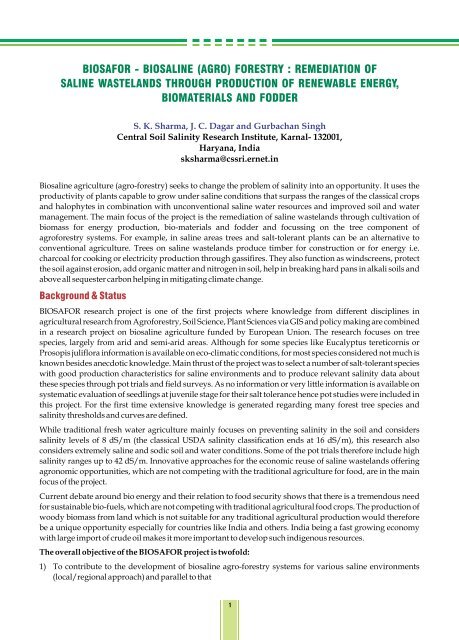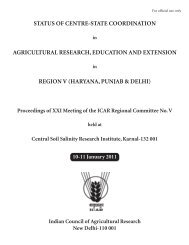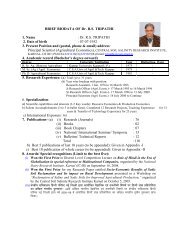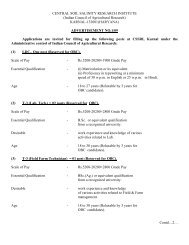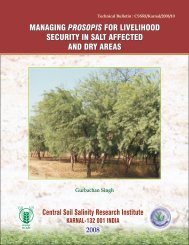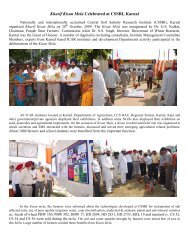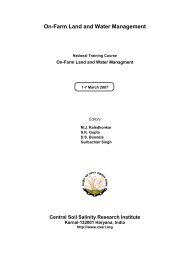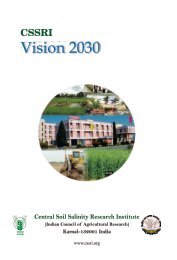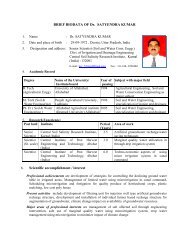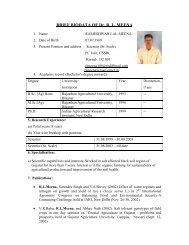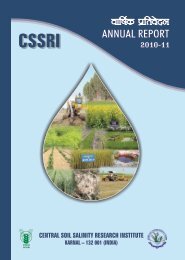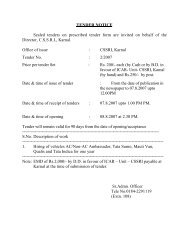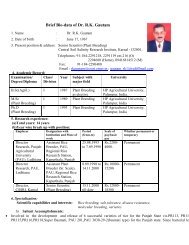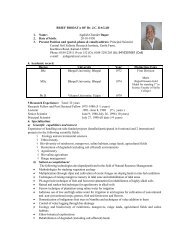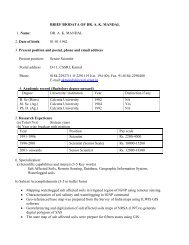BIOSAFOR - BIOSALINE (AGRO) FORESTRY - Central Soil Salinity ...
BIOSAFOR - BIOSALINE (AGRO) FORESTRY - Central Soil Salinity ...
BIOSAFOR - BIOSALINE (AGRO) FORESTRY - Central Soil Salinity ...
You also want an ePaper? Increase the reach of your titles
YUMPU automatically turns print PDFs into web optimized ePapers that Google loves.
<strong>BIOSAFOR</strong> - <strong>BIOSALINE</strong> (<strong>AGRO</strong>) <strong>FORESTRY</strong> : REMEDIATION OF<br />
SALINE WASTELANDS THROUGH PRODUCTION OF RENEWABLE ENERGY,<br />
BIOMATERIALS AND FODDER<br />
S. K. Sharma, J. C. Dagar and Gurbachan Singh<br />
<strong>Central</strong> <strong>Soil</strong> <strong>Salinity</strong> Research Institute, Karnal- 132001,<br />
Haryana, India<br />
sksharma@cssri.ernet.in<br />
Biosaline agriculture (agro-forestry) seeks to change the problem of salinity into an opportunity. It uses the<br />
productivity of plants capable to grow under saline conditions that surpass the ranges of the classical crops<br />
and halophytes in combination with unconventional saline water resources and improved soil and water<br />
management. The main focus of the project is the remediation of saline wastelands through cultivation of<br />
biomass for energy production, bio-materials and fodder and focussing on the tree component of<br />
agroforestry systems. For example, in saline areas trees and salt-tolerant plants can be an alternative to<br />
conventional agriculture. Trees on saline wastelands produce timber for construction or for energy i.e.<br />
charcoal for cooking or electricity production through gassifires. They also function as windscreens, protect<br />
the soil against erosion, add organic matter and nitrogen in soil, help in breaking hard pans in alkali soils and<br />
above all sequester carbon helping in mitigating climate change.<br />
Background & Status<br />
<strong>BIOSAFOR</strong> research project is one of the first projects where knowledge from different disciplines in<br />
agricultural research from Agroforestry, <strong>Soil</strong> Science, Plant Sciences via GIS and policy making are combined<br />
in a research project on biosaline agriculture funded by European Union. The research focuses on tree<br />
species, largely from arid and semi-arid areas. Although for some species like Eucalyptus tereticornis or<br />
Prosopis juliflora information is available on eco-climatic conditions, for most species considered not much is<br />
known besides anecdotic knowledge. Main thrust of the project was to select a number of salt-tolerant species<br />
with good production characteristics for saline environments and to produce relevant salinity data about<br />
these species through pot trials and field surveys. As no information or very little information is available on<br />
systematic evaluation of seedlings at juvenile stage for their salt tolerance hence pot studies were included in<br />
this project. For the first time extensive knowledge is generated regarding many forest tree species and<br />
salinity thresholds and curves are defined.<br />
While traditional fresh water agriculture mainly focuses on preventing salinity in the soil and considers<br />
salinity levels of 8 dS/m (the classical USDA salinity classification ends at 16 dS/m), this research also<br />
considers extremely saline and sodic soil and water conditions. Some of the pot trials therefore include high<br />
salinity ranges up to 42 dS/m. Innovative approaches for the economic reuse of saline wastelands offering<br />
agronomic opportunities, which are not competing with the traditional agriculture for food, are in the main<br />
focus of the project.<br />
Current debate around bio energy and their relation to food security shows that there is a tremendous need<br />
for sustainable bio-fuels, which are not competing with traditional agricultural food crops. The production of<br />
woody biomass from land which is not suitable for any traditional agricultural production would therefore<br />
be a unique opportunity especially for countries like India and others. India being a fast growing economy<br />
with large import of crude oil makes it more important to develop such indigenous resources.<br />
The overall objective of the <strong>BIOSAFOR</strong> project is twofold:<br />
1) To contribute to the development of biosaline agro-forestry systems for various saline environments<br />
(local/regional approach) and parallel to that<br />
1


